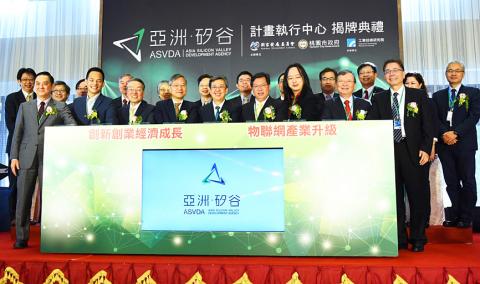Vice President Chen Chien-jen (陳建仁) on Sunday inaugurated the base for the implementation of the government’s “Asian Silicon Valley” project, which is designed to improve the nation’s overall economic structure.
The major tasks of the Executive Center for the Asian Silicon Valley Plan in Taoyuan are to promote the Internet of Things (IoT) and innovative industries, boost economic development by integrating local and international sectors, and push industrial transformation, Chen said at the ceremony.
The opening is the first step for the executive center, from which Taiwan intends to bring together talent in innovation from around the world, making them into the power driving Taiwan’s industrial upgrade and transformation, Chen said.

Photo: Lee Jung-ping, Taipei Times
The center is in a financial building in front of the Taoyuan High Speed Rail Station in Jhongli District (中壢).
Chen said the new facility is expected to develop Taoyuan into the engine for Taiwan’s economic development.
The plan was not formed to make a Taiwanese copy of Silicon Valley in California, “but to encourage Taiwanese industries to have the spirit of innovation,” Chen said.
According to the National Development Council, which drafted the Asian Silicon Valley implementation plan, it consists of “one ecosystem,” “two objectives,” “three links” and “four strategies.”
The ecosystem means the formation of a cluster of innovative start-ups with a heavy focus on research and development (R&D), while the two objectives include one to foster the ecosystem and another to promote innovative R&D for IoT industries, the council said. The three links means joining local industries to connect Taiwan to the world and build links to the future.
As for the four strategies, they are the concrete steps the government will take to tie Taiwan to Silicon Valley and other global technology clusters, turning the nation into an innovative start-up destination for young Asians and creating new industries for the next generation, it said.
The implementation strategies include creating a robust start-up and entrepreneurship ecosystem by cultivating innovative talent, providing business expansion capital and adjusting laws to create a friendlier environment for start-ups; establishing a one-stop service center to integrate the R&D capabilities of Silicon Valley and other global innovation clusters; integrating Taiwan’s hardware advantages into software applications; and establishing a quality Internet environment, it said.
The plan’s implementation period will run through 2023, the council said.
A budget of NT$11.3 billion (US$350.4 million) has already been allocated for next year for Internet infrastructure, mobile broadband services, e-commerce, smart applications, industry-university collaboration, test beds, digital talent and regulatory adjustment, the council said.
Projecting the combined effect of the Asian Silicon Valley plan and other digital economy plans, the council said it expects Taiwan’s IoT global market share to climb from 3.8 percent last year to 4.2 percent by 2020 and to 5 percent by 2025.
Premier Lin Chuan (林全) has said that the aim of the plan is to improve the nation’s overall economic structure.
The Asian Silicon Valley initiative is similar in nature to the Industry 4.0 movement taking hold around the world and is one of five innovative industries upon which President Tsai Ing-wen (蔡英文) has vowed to focus, Lin said.
Four other innovative industries the Tsai administration has designated as the core of Taiwan’s economy are “smart” machinery, “green” technology, biomedical technology and national defense.

Taiwanese can file complaints with the Tourism Administration to report travel agencies if their activities caused termination of a person’s citizenship, Mainland Affairs Council Minister Chiu Chui-cheng (邱垂正) said yesterday, after a podcaster highlighted a case in which a person’s citizenship was canceled for receiving a single-use Chinese passport to enter Russia. The council is aware of incidents in which people who signed up through Chinese travel agencies for tours of Russia were told they could obtain Russian visas and fast-track border clearance, Chiu told reporters on the sidelines of an event in Taipei. However, the travel agencies actually applied

Japanese footwear brand Onitsuka Tiger today issued a public apology and said it has suspended an employee amid allegations that the staff member discriminated against a Vietnamese customer at its Taipei 101 store. Posting on the social media platform Threads yesterday, a user said that an employee at the store said that “those shoes are very expensive” when her friend, who is a migrant worker from Vietnam, asked for assistance. The employee then ignored her until she asked again, to which she replied: "We don't have a size 37." The post had amassed nearly 26,000 likes and 916 comments as of this

New measures aimed at making Taiwan more attractive to foreign professionals came into effect this month, the National Development Council said yesterday. Among the changes, international students at Taiwanese universities would be able to work in Taiwan without a work permit in the two years after they graduate, explainer materials provided by the council said. In addition, foreign nationals who graduated from one of the world’s top 200 universities within the past five years can also apply for a two-year open work permit. Previously, those graduates would have needed to apply for a work permit using point-based criteria or have a Taiwanese company

The Shilin District Prosecutors’ Office yesterday indicted two Taiwanese and issued a wanted notice for Pete Liu (劉作虎), founder of Shenzhen-based smartphone manufacturer OnePlus Technology Co (萬普拉斯科技), for allegedly contravening the Act Governing Relations Between the People of the Taiwan Area and the Mainland Area (臺灣地區與大陸地區人民關係條例) by poaching 70 engineers in Taiwan. Liu allegedly traveled to Taiwan at the end of 2014 and met with a Taiwanese man surnamed Lin (林) to discuss establishing a mobile software research and development (R&D) team in Taiwan, prosecutors said. Without approval from the government, Lin, following Liu’s instructions, recruited more than 70 software